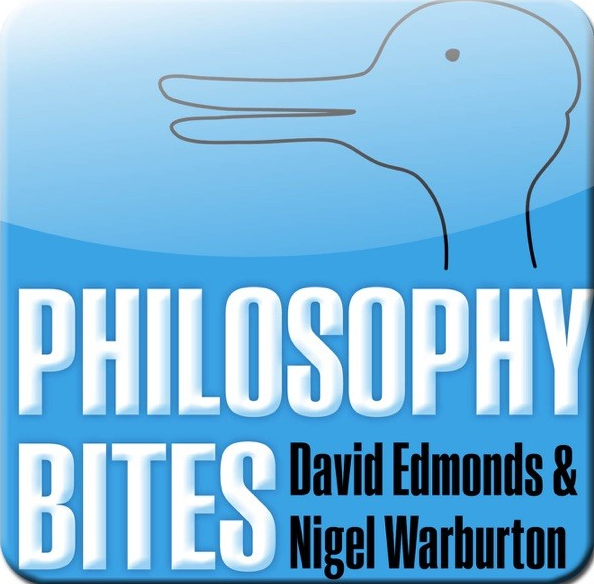Philosophy Bites (podcast)
Subject: Philosophy
Type: Podcast
Hosts: David Edmonds and Nigel Warburton

How long is it?
There are 380 episodes. The episodes are 10-25 minutes in length.
Is it easy to understand?
It is helpful to have learnt the definitions of philosophical terminology in advance.
Who is it for?
It is aimed at those who study philosophy or are interested in it.
How recent is it?
The first episode was released in 2007 and episodes continue to be released.
Philosophers interviewed in Philosophy Bites (sorted by surname)
Arash Abizadeh
Peter Adamson
Lucy Allais
Elizabeth Anderson
Julia Annas
Anthony Appiah
John Armstrong
Catalin Avramescu
Julian Baggini
Sarah Bakewell
Tim Bayne
Helen Beebee
Teresa Bejan
Chris Betram
Simon Blackburn
Ned Block
Paul Bloom
Paul Boghossian
Emma Borg
Lisa Bortolotti
Nick Bostrom
Alain de Botton
Richard Bourke
Luc Bovens
Richard Bradley
Liam Bright
John Broome
Wendy Brown
Kimberley Brownlee
Pascal Bruckner
Allen Buchanan
Myles Burnyeat
Agnes Callard
John Campbell
Clare Carliste
Noel Carrol
Gregg Caruso
Peter Cave
David Chalmers
Clare Chambers
Myisha Cherry
Patricia Churchland
Andy Clark
Skye Cleary
Tony Coady
G. A. Cohen
John Cottingham
Edward Craig
Tim Crane
Roger Crisp
Simon Critchey
Molly Crockett
Don Cupitt
Greg Currie
Fiery Cushman
Elizabeth Schellekens Dammann
Jonathan Dancy
Normal Daniels
Stephen Darwall
Stephen Davies
Hannah Dawson
Daniel Dennet
Michael Devitt
Donna Dickenson
Sabine Doring
Michael Dummett
John Dunn
John Dupre
Ronald Dworkin
David Eagleman
David Edmonds
Daniel Everett
Cécile Fabre
Katalin Farkas
Kit Fine
Sarah Fine
Suki Finn
Katrin Flikschuh
Luciano Floridi
Gary Francione
Keith Frankish
Cynthia Freeland
Miranda Fricker
Chris Frith
Raimond Gaita
Sebastian Gardner
John Gardner
Tamar Gendler
Raymond Geuss
Simon Glendinning
Jonathan Glover
Peter Godfrey-Smith
Philip Goff
Rebecca Newberger Goldstein
Alison Gopnik
Anthony Gottlieb
A. C. Grayling
Leslie Green
Joshua Greene
Edith Hall
Henry Hardy
Rom Harre
Katherine Hawley
Scott Hershovitz
Samantha Rose Hill
Angie Hobbs
Ted Honderich
Brad Hooker
Jennifer Hornsby
Thomas Hurka
Steven Hyman
Michael Ignatieff
William B. Irvine
Terence Irwin
Frank Jackson
Susan James
Dale Jamieson
Christopher Janaway
Kate Jeffery
Eileen John
Shelly Kagan
Sean Kelly
Anthony Kenny
Ro Khanna
Kate Kirkpatrick
James Klagge
Joshua Knobe
Christine Korsgaard
Matthew Kramer
Chandran Kukathas
Will Kymlicka
Nicola Lacey
Peter Lamarque
Michael Lamb
Melissa Lane
Rae Langton
Stephen Law
Seth Lazar
Brian Leiter
Meira Levinson
Jerrold Levinson
Neil Levy
Tim Lewens
Benjamin Lipscomb
Christian List
Guy Longworth
Steven Lukes
William MacAskill
Catharine MacKinnon
Fiona Macpherson
Noel Malcolm
Kate Manne
Michael Martin
Derek Matravers
Simon May
M. M. McCabe
Marilyn McCord
Colin McGinn
Jeff McMahan
Hugh Mellor
Aaron Meskin
John Mikhail
David Miller
Christian Miller
Peter Millican
Cheryl Misak
Ray Monk
Adrian Moore
Katherine Morris
Jessica Moss
Stephen Mulhall
Steven Nadler
Jennifer Nagel
Stephen Neale
Alexander Nehamas
Alex Neill
Susan Neiman
Shaun Nichols
Richard Norman
Martha Nussbaum
Onora O’Neill
Josiah Ober
David Owens
David Papineau
L. A. Paul
Philip Pettit
Anne Phillips
Nick Phillipson
Hanna Pickard
Massimo Pigliucci
Thomas Pink
Thomas Pogge
Huw Price
Graham Priest
Jesse Prinz
Michael Puett
Theron Pummer
Cassim Quassam
Janet Radcliffe
Peter Railton
Jonathan Ree
Richard Reeves
Aaron Ridley
Regina Rini
Rebecca Roache
Ben Rogers
Gideon Rosen
Adina Roskies
Carlo Rovelli
Mark Rowe
Mark Rowlands
Paul Russell
Alan Ryan
Peter Salmon
Michael Sandel
Jennifer Saul
Julian Savulescu
Tim Scanlon
Samuel Scheffler
Philip Schofield
Eric Schwitzgebel
Sophie Scott
Roger Scruton
Anil Seth
Kieran Setiya
Christopher Shields
Peter Singer
Walter Sinnott-Armstrong
Quentin Skinner
John Skorupski
Barry Smith
Robert Rowland Smith
Paul Snowdon
Kate Sopher
Richard Sorabji
Tom Sorell
Dan Sperber
Amia Srinivasan
Hillel Steiner
Robert Stern
Kathleen Stock
Tom Stoneham
Galen Strawson
Barry Stroud
Paul Sugar
Stewart Sutherland
Adam Swift
Victor Tadros
Robert B. Talisse
Robert Talisse
Raymond Tallis
John Tasioulas
Larry Temkin
Emily Thomas
Tzvetan Todorov
John Tomasi
Richard Tuck
Michael Tye
Roberto Mangabeira Unger
Carissa Veliz
Mark Vernon
Alex Voorhoeve
Kendall Walton
Nigel Warburton
Keith Ward
Leif Warner
Mary Warnock
Jonathan Webber
Timothy Williamson
Tim Williamson
James Wilson
Catherine Wilson
Susan Wolf
Jonathan Wolff
David Bather Woods
John Worrall
Robert Wright
Liane Young
Theodore Zeldin
My thoughts…
One thing you should know about Wider Reading Geek is that I will never write about something I haven’t read/watched/listened to. I’m not going to pretend that I’ve listened to every single episode of Philosophy Bites because I doubt you would attempt to do so either. Instead, I suggest listening to the episodes whose titles intrigue you most. Here are some of the ones I listened to, as well as my opinions on the topics discussed:
- William MacAskill on Longtermism
- Robert Wright on Why Buddhism is True
- Stephen Law on The Problem of Evil
Are our lives more important than the lives of people who have not yet been born?
I believe that people in the future matter just as much as people today because the time at which someone is alive does not dictate the value of their life. The fact that a person is not yet alive is irrelevant to their importance. This means that we should invest resources into the protection of future generations. If we disregard the people of the future, the the state of the world could gradually decline until bringing children into the world becomes immoral. As well as this, it is reasonable to assume that the world’s population will be larger in the future, so the number of people affected by the long-term effects of our actions will be greater than the number of people seeing the short-term effects.
However, in conversations regarding the future, an element of uncertainty will inevitably persist. We cannot be sure of the best way in which to make a life in thousands of years better, whereas we can be more confident about the impact of our actions on people born within the next couple of centuries. This is why I believe that we need some balance between reducing future harm and making the better place now. In order for this balance to be struck, I think we should give the people of the future more consideration.
Should we aim for nirvana?
In Buddhism, nirvana is a transcendent state in which there is neither suffering, desire, nor sense of self. It is the final goal of Buddhism and a person in this state has escaped the effects of karma and the cycle of death and rebirth. I believe that if we look past the supernatural and transcendental aspects of Buddhism and investigate its philosophical wisdom, we can be guided through the complex modern world. There are three marks of existence in Buddhism, and one of these is dukkha, which means suffering, or dissatisfaction. Buddhists believe that suffering arises because of craving, so to escape suffering we must change our relationship with desire.
This is easier said than done, primarily because humans are hardwired to be dissatisfied. However, Buddhists use meditation techniques to move past this. In our modern world full of genius advertising and stress, I believe that a Buddhist approach is invaluable. Meditation cultivates a calmer mind which could make us more productive and compassionate as a society. Arguably, our consumerist culture is not doing the environment any favours, so I see Buddhism’s rejection of craving as something we should be aiming for. Therefore, I think we should aim to develop a deeper understanding of the world through a Buddhist lens, although not necessarily for the purpose of transcending the physical world.
Does the existence of evil disprove the existence of an omnibenevolent and omnipotent god?
I do not think the existence of a god can be wholly proven or disproven. However, I think that the problem of evil makes the existence of an all-loving, all-powerful god unlikely. The reason I think this relates more to the evidential problem of evil than the logical problem of evil. There are various arguments which make the logical problem of evil weaker than the evidential one, such as the idea that evil serves the purpose of making the good stand out.
However, the quantity of evil seems to suggest that if there is a god, he cannot be both omnipotent and omnibenevolent because otherwise, he would have prevented at least some of this evil. The argument that there is evil because God gave us free will does not work because it does not explain the origin of volcanic eruptions and earthquakes. We did not choose the movements of tectonic plates. Furthermore, I think the argument that evil is simply the absence of good, suggesting that evil does not exist, is just a play on words. People suffer and we can see this with our own eyes. This means that the existence of an all-powerful, all-loving God is unlikely and the arguments for why there must be a god, such as the design argument and the cosmological argument, do not indicate that this god must be omnipotent or omnibenevolent.
